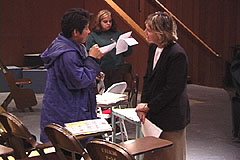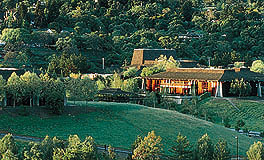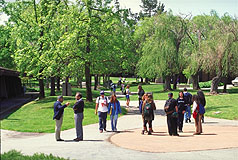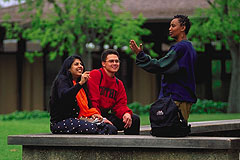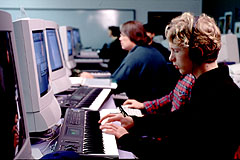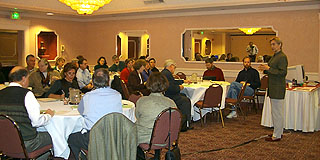What is the research question? For several years, enrollment in our general education music course had been declining. Music is central to the lives of today's young students, so why was enrollment declining? Five years ago I had a hypothesis that two of the most important contributors to the decline were course content and delivery. Content: the existing course was based on Western European "classical" music. Although this curriculum remains the higher education standard, it does not adequately address the interests, needs, or cultures of contemporary students who have come of age in an increasingly diverse, multicultural society. Delivery: today's "digital generation" students have spent their lives surrounded by electronic media and learning through participation and experience. The existing course had been taught in the sequential, passive, and pyramidal approach of traditional higher-ed curriculum. If my hypothesis was correct, it meant that the existing course needed to be transformed into an entirely new course. My research question, then, became:
|
||||||||
Where was the research done? Located in the heart of Silicon Valley in California, the Foothill College campus has won numerous architectural design awards and is cited by the San Francisco Chronicle as the "most beautiful community college every built." In 1994, Foothill College was the first California community college to offer instruction online via the Internet. Foothill strives to maintain a record of academic excellence and innovation and to that end, faculty and staff continually examine what they do and how they do it to make programs and services better serve the needs of students. It is in the spirit of this examination that this course portfolio which analyzes Music of Multicultural America was undertaken.
|
||||||||
When was the research done? This course portfolio was created during the 1999-2000 academic year as part of Elizabeth Barkley's work as a member of the 1999 class of Carnegie Scholars. It builds upon her work as a college music professor and her puzzling over course problems as early as 1994. Additionally, the course portfolio will continue beyond the 1999-2000 academic year as she continues to enrich it with new research questions, evidence and analysis in subsequent generations of the course. |
||||||||
Summary on Line Graph Academic Year, 1994-95: Puzzling Over Conventional Course Problems Summer 1995: Participation in UC Berkeley's Seminar on American Cultures Academic Year 1995-96 Course Modified for Content Academic Year 1996-97: Course Modified for Pedagogy 1997-98: Course Modified for Web Delivery 1998-99: Course Modified for "Blended Delivery" 1999-2000: Research on Course Transformation |
||||||||
Why is the research and evidence important? Today's classrooms frequently contain students with extraordinarily diverse backgrounds in everything from age, socio-economic level, race and ethnicity to primary language and academic preparedness. This diversity presents significant teaching challenges. Furthermore, today's "digital generation" students have spent their lives surrounded by electronic media and learning through participation and experience. This presents a problem to those of us raised in (and continuing to teach in) the sequential, passive, and pyramidal approach of traditional higher-ed curriculum. If teachers are going to be effective, they must learn strategies to meet the needs of this new and different cohort of students. This course portfolio attempts to identify ways to address these issues.
|
||||||||
How was the research conducted? The research was conducted using a multilayered, multimedia hypertext electronic course portfolio. The course portfolio is a relatively recent contribution to research design for the scholarship of teaching and learning. According to Pat Hutchings, course portfolios help faculty "investigate and document what they know and do as teachers in ways that will contribute to more powerful student learning." They are still in the process of invention, but Lee Shulman has proposed four different formats that can serve as frameworks: Anatomical in which the researcher asks how the individual course elements such as tests, lectures, projects fit together to form the larger, working system; Natural History in which the researcher analyzes how the course unfolds or evolves, either within itself or across multiple generations of the same course; Ecological in which the researcher explores how the course fits within the larger curricular programmatic context; and Investigation in which, for example, the researcher might develop hypotheses, create interventions, and then analyze the course for the efficacy of those interventions. My course portfolio contains elements of all four frameworks. It looks at the structure of the course's content, delivery, and assessment (anatomical); analyzes the evolution of the course from the baseline to its transformed versions (historical); explores how the transformed course fits within the general education curricular pattern (ecological); and explores the efficacy of a series of interventions drawn from the two overarching hypotheses (investigation). It is an example of a new version of the course portfolio in that it attempts to utilize the distinct characteristics of the world wide web such as multimedia, interactivity, and hyperlinks. |
||||||||
How does the research represent "The Scholarship of Teaching and Learning?" Research related to learning and the assessment of learning has received considerable attention over the last decade. Many higher education faculty want to improve their teaching and would happily build upon the work of Boyer (1990) and Glassic, Huber and Maeroff (1997) who seek to foster a conception of teaching as scholarly work. This conception requires that teaching be public, subject to critical evaluation and usable by others in both the scholarly and general community. Public: The work has been documented as a web-based course portfolio that is posted and available on the Carnegie Knowledge Media Lab. Critical Evaluation: The portfolio is available for evaluation; there are specific locations within the site that have been created for feedback; and it was reviewed by Foothill College's Campus Conversations Faculty Leadership Team. (Link to Campus Conversations?) Useable by Others: As a web-based course portfolio, it is available in the Carnegie Knowledge Media Lab, and all of the work and artifacts are usable by others.
A group of 1999 CASTL Scholars discuss their scholarship of teaching projects. |







